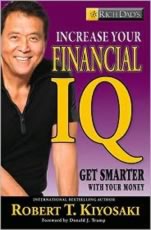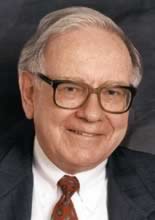Robert Kiyosaki: Increase your financial IQ

 The problem with the standard financial advice is that it’s bad advice. You’ve been told to work hard, save money, get out of debt, live below your means, and invest in a well-diversified portfolio of mutual funds. But this advice is obsolete — so argues Robert Kiyosaki in his new book, Rich Dad’s Increase Your Financial IQ.
The problem with the standard financial advice is that it’s bad advice. You’ve been told to work hard, save money, get out of debt, live below your means, and invest in a well-diversified portfolio of mutual funds. But this advice is obsolete — so argues Robert Kiyosaki in his new book, Rich Dad’s Increase Your Financial IQ.
Increase Your Financial IQ is the latest installment in Kiyosaki’s tremendously popular “Rich Dad” series of books. These best-sellers have motivated many people (including me) to take control of their financial lives. But some (including me) have expressed concerns over the author’s advice:
- Kiplinger’s Personal Finance: They say they want you to be rich
- John T. Reed: An analysis of Rich Dad, Poor Dad
Kiyosaki loves to play the rogue, offering unconventional suggestions for building wealth. He’s a vocal detractor of mutual funds, for example, and frequently seems to be pushing a new “hot” investment: real estate, oil, gold, silver. He likes to make provocative claims like “people should not live below their means”.
Yet if you dig a little deeper, it becomes clear that Kiyosaki is saying a lot of this just to get attention. It’s a marketing ploy. He really does think it’s important to spend less than you earn — he just thinks the best approach to a budget deficit is to raise your earning power instead of reducing spending. Armed with my own advice about how to read a personal finance book, I decided to give Increase Your Financial IQ a chance. I approached it with an open mind. Ultimately I read it three times. I’m still not sure what to think of it.
Financial Intelligence
“It is not real estate, stocks, mutual funds, businesses, or money that make a person rich,” Kiyosaki writes. “It is information, knowledge, wisdom, and know-how, a.k.a. financial intelligence, that makes one wealthy.” He notes that buying a new set of golf clubs won’t improve your game, but paying for lessons will. It’s his hope that Increase Your Financial IQ can help readers improve their money “game.”
Kiyosaki divides financial intelligence into five “Financial IQs”:
- Making more money. This is measured by how much money you earn. If you make $100,000 a year, you have a higher Financial IQ than someone earning $30,000 a year.
- Protecting your money. Once you earn your money, you need to hold onto it. Protecting your money, especially from taxes, is the second Financial IQ.
- Budgeting your money. “Being able to live well and still invest no matter how much you make requires a high level of financial intelligence,” Kiyosaki writes. This Financial IQ is measured by how much money you have left after expenses.
- Leveraging your money. This Financial IQ is measured by return on investment. How well do you make your budget surplus generate more money?
- Improving your financial information. Financial information doesn’t just mean knowledge of basic financial concepts — it also means detailed knowledge of the investments you make.
Most of the book is devoted to exploring these five aspects of financial intelligence in detail.
Financial IQ #1: Making More Money
Many people fail to acquire wealth, Kiyosaki says, because they want the money without the work. “What many people do not realize,” he writes, “is that it’s the process that makes them rich, not the money.” It’s by learning to make money that you can continue to make money. For each person, the process will be different. We each have different goals, dreams, and ambitions. The important thing is to find the best way for you to make more money, and then to build your goals around this.
In order to make money, you must also learn to control your emotions. You must learn to defer gratification. Don’t sacrifice your financial future for a few bucks today. Don’t give up. The going can seem tough at times, but if you’re confident in your course, you can learn to solve the problems. Keep your eyes on your goal and find a way to reach it.
According to Kiyosaki, the key to making money is learning to solve problems. “In order to grow wealthy,” he writes, “you must come to terms with the fact that problems will never go away.” Identify the problems preventing you from wealth, tackle them head-on, and the money will follow.
Financial IQ #2: Protecting Your Money
Once you’ve begun to make money, you need to protect it from “financial predators”. Kiyosaki says there are seven of them to beware:
- Bureaucrats — Kiyosaki acknowledges the need to pay taxes, but he argues that it’s his job to (legally) pay as little as possible.
- Bankers — Banks are constantly trying to siphon bits of your money in the form of fees. It’s important to watch out for and protect against this.
- Brokers — Similarly, fees from brokers can chip away at your wealth. He cites brokers who “churn” accounts, buying and selling stocks frequently in order to generate more commissions. (We had this happen to us once with the box factory’s retirement account.)
- Businesses — “All businesses have something to sell,” Kiyosaki writes. Their job is to part you from your money; yours is to keep it. Kiyosaki suggests asking yourself whether any particular purchase will make you richer or poorer.
- Brides and beaus — Money plays an key role in any relationship. You must trust your partner, must reach an understanding about finances.
- Brothers-in-law — Here, Kiyosaki’s “B” theme is stretched to its limit. His point is that in order to protect your estate from family members you don’t intend to share it with, you need to plan for your death.
- Barristers — Finally, it’s important to protect yourself from legal difficulties.
Though Kiyosaki lists seven possible pitfalls, he offers little practical advice for coping with them. How does one go about paying as little tax as possible? What is the best way to approach estate planning?
Financial IQ #3: Budgeting Your Money
There are two ways to solve a budget crunch: decrease your spending or increase your income. Either will erase a budget deficit, but Kiyosaki believes (as I do) that in the long run, increasing income is a better solution.
Kiyosaki explains that it’s important to think of a budget surplus a fixed expense. If you decide to save 10% of your income, then make this ten percent a fixed item in your budget. Treat it just as you would any other bill. Pay yourself first. “You can tell a person’s future by looking at what they spend their time and money on,” writes Kiyosaki (channeling the voice of Rich Dad). “Time and money are very important assets. Spend them wisely.”
Kiyosaki notes that when things get rough, people tend to cut back rather than spend. But if they’d simply prioritize spending, they could actually improve the situation. Spend less on beer and pretzels, sure, but spend more on continued education and self-promotion.
Refuse to live below your means, Kiyosaki writes. Instead, increase your means.
Financial IQ #4: Leveraging Your Money
This is the longest and most frustrating chapter of the entire book. It represents the core of Kiyosaki’s financial philosophy, yet it’s not presented in a way that makes it relevant to average people like you and me.
 Leverage — borrowing money to increase the power of your own cash — is good, Kiyosaki says, if you have the financial intelligence to control the investment. But if you’re not in control of the investment, then leverage is risky. “Most of the people being hurt by the real estate meltdown are people who were counting on the real estate market to keep going up and increasing their home’s value,” he writes. They borrowed against their home’s inflated value, but had no control over whether the housing market rose or fell. This is a lack of financial intelligence.
Leverage — borrowing money to increase the power of your own cash — is good, Kiyosaki says, if you have the financial intelligence to control the investment. But if you’re not in control of the investment, then leverage is risky. “Most of the people being hurt by the real estate meltdown are people who were counting on the real estate market to keep going up and increasing their home’s value,” he writes. They borrowed against their home’s inflated value, but had no control over whether the housing market rose or fell. This is a lack of financial intelligence.
Instead, Kiyosaki argues, one should use leverage to make low-risk investments, investments in which you, as the investor, have control. This sounds great, but he doesn’t provide any relevant examples. He discusses his recent purchase of a 300-unit, $17 million apartment complex in Tulsa, Oklahoma. “[This] is a good investment to use leverage with because I have control over the operations, and the operations…determine the value of the investment.”
But what if I don’t have $17 million? What if I only have $17,000? Or $1,700? How does the average person make leverage work for her? (This is one of the interview questions I submitted to Kiyosaki — I still haven’t received a reply.)
Financial IQ #5: Improving Your Financial Information
Warren Buffett is the most successful investor of all time, yet he never takes a gamble. Buffett (and his partner, Charlie Munger) conduct extensive research for every decision they make. Before they buy a company, they want to know everything about it. Obtaining this information allows them to invest with confidence.
By contrast, I’ve made some really dumb investments. I’ve purchased stocks on the hope that they would increase. These sorts of decisions are not based on information — they’re based on emotion.
In order to improve your financial information, it’s important to:
- Separate fact from opinion. Many gurus are happy to offer their opinions — “gold is going up!” — but it’s foolish to make financial decisions based on these. Base your decisions on facts.
- Verify information. Don’t trust just one source of information, but seek confirmation from other parties.
- Know the rules. If you don’t understand how an investment works, don’t make it. “Rules provide a valuable source of information about how the game of money is played,” Kiyosaki writes.
- Understand trends. Trends are historical facts. Smart investors can use trends to make informed decisions. However, it’s important to note that trends do not project to future facts — only to opinions about possible futures. Still, trends are valuable sources of financial information.
“Ultimately,” Kiyosaki writes, “it is not the asset that makes you rich. Information makes you rich.”
Developing Your Financial Genius
Though an overview of the five Financial IQs forms the bulk of this 200 page book, it’s actually the last fifty pages that hold the most value. It is in these three chapters that Kiyosaki discusses “the integrity of money” and explains how to develop your financial genius.
He offers interesting recommendations, such as the importance of producing personal financial statements. He writes about bringing your financial actions in line with your beliefs. He writes about the psychology of money, giving special attention to fear of failure. He writes about the power of financial environments. If you want to become richer and more successful, he says, it becomes critical that you find an environment that allows you to grow and develop.
Financial Integrity
I like the idea of Rich Dad’s Increase Your Financial IQ. The book fills a niche about which little has been written. It’s motivational. I love Kiyosaki’s Big Ideas. They’re a breath of fresh air, offering a perspective often missing in personal finance discussion. I also like that his writing always motivates me to action, pushing me to pursue my goals.
However — and this is a big however — I’m often frustrated by the specifics in his books. Increase Your Financial IQ is no exception. It’s not just that I disagree with him; I actually believe he’s wrong. Let’s look at an example.
Kiyosaki does not believe in diversification. He spends a lot of time criticizing financial experts who recommend a well-diversified portfolio of mutual funds. “The problem with that advice is most advisors don’t know if it will work over time,” he writes. “I want to ask the expert, ‘Will you guarantee that this financial strategy will work?'”
But then Kiyosaki admits that he cannot guarantee his own strategies. I’m puzzled. Why condemn the conventional wisdom for a weakness you admit your own methods possess? At least proponents of index funds have a long history of facts and trends to support their assertions. Isn’t this one of the very components of financial intelligence this book purportedly praises?
Related >> Are Index Funds the Best Investment?
 It’s stuff like this that prevents me from recommending Kiyosaki’s books without reservation. Diversification isn’t a hoax. It isn’t a scam. Other than Kiyosaki, it’s embraced by almost every financial author I’ve ever read. Diversification is a central tenet of modern portfolio theory. It’s backed by facts, not opinions.
It’s stuff like this that prevents me from recommending Kiyosaki’s books without reservation. Diversification isn’t a hoax. It isn’t a scam. Other than Kiyosaki, it’s embraced by almost every financial author I’ve ever read. Diversification is a central tenet of modern portfolio theory. It’s backed by facts, not opinions.
Related >> An Introduction to Diversification
“The richest investor in the world, Warren Buffett, does not diversify,” Kiyosaki says. His implication is that you should not diversify either, but that’s completely counter to what Buffett believes. Buffett does not diversify because he’s a professional. His life work is investing. For 99% of all investors, Buffett recommends diversified index funds. (“Maybe more than 99%,” Buffet has said.) It’s disingenuous of Kiyosaki to pretend otherwise.
There are other problems of the same nature in Kiyosaki’s books. That doesn’t mean they don’t have value. They do. Many people (and I’m one of them) have found the Rich Dad series a powerful motivator. I just think it’s important to read these books — and all personal finance books, for that matter — with an active filter, questioning what you read, picking the parts that apply to your life and discarding the rest. To me, that’s real financial intelligence.
You can read other reviews of Increase Your Financial IQ at these sites:
- Blueprint for Financial Prosperity (Jim likes it because it deals with high-level concepts.)
- Zen Personal Finance (Justin likes the core of the book, though he feels it’s recycled material.)
- Million Dollar Journey (MDJ, too, thinks there’s both good and bad here)
Become A Money Boss And Join 15,000 Others
Subscribe to the GRS Insider (FREE) and we’ll give you a copy of the Money Boss Manifesto (also FREE)

